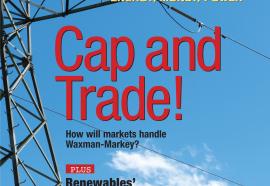Hobson's Hamburger
It’s time to end the uncertainty about carbon costs.
This summer marked a pivotal moment for the energy industry. In June, the U.S. House of Representatives approved the American Clean Energy and Security Act (ACES), a.k.a., the Waxman-Markey bill, which among other things would require the U.S. economy to cut its greenhouse-gas (GHG) emissions 83 percent by 2050.






